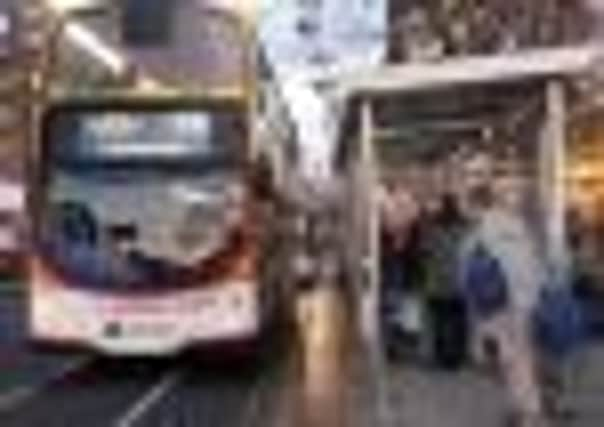Iain Gray: Taking the right route to protect bus services


One of the joys of being a backbench parliamentarian is that you can choose to pursue what interests you, rather than bow to the demands of “events” and the obligations of government or shadow cabinet. It helps to pick things which really matter to your constituents as well. So today I announced a first for me – my intention to bring forward a private member’s bill at Holyrood to allow local authorities to regulate bus services in their area.
I like buses. My grandfather painted them, my dad examined them for the Ministry of Transport, and as a student I toted a “Setright” ticket machine as a bus conductor. It was a great holiday job, although not without danger. There were certain late-night routes of legendary peril, indeed a colleague once had a gun pulled on him on the “last Dunbar” on Saturday night. That was a fare he failed to collect.
Advertisement
Hide AdAdvertisement
Hide AdIn those days this was an industry with a high “character” quotient. There was, for example, Honest John, the Flying Bus Conductor. A bachelor, John saved every penny to fly around the world. Yet he had never visited any other country. On arrival, he would simply catch the first flight home, without leaving the airport. The airlines treated John like a VIP and included him on trips like Concorde’s inaugural flight to New York. How he came by the sobriquet “Honest” is a whole other story.
Management could be a bit eccentric too. Many of them drove the occasional shift for fun, and some owned vintage buses for real “busmen’s holidays”. They were also plotting to revolutionise their industry. First, they got rid of conductors like Honest John, and made drivers collect the fares themselves. Buses got slower, and the job less fun, but they cut costs. When the Tories took power in 1979, their big chance came. The Scottish Bus Group was privatised, and the industry deregulated. Some of those self-same managers made a lot of money as companies were bought and sold. But what happened to services and passengers?
Deregulation drove some innovation in bus services. But it also introduced cowboy operators, bus wars, and a ruthless concentration on highly profitable arterial commuter routes, bypassing villages and housing schemes.
Devolution brought transport under Scottish Parliament control. But bus passenger numbers had declined to an all-time low by 2011, falling in some areas by as much as 27 per cent in a year. Fares have risen by more than 50 per cent since 1999.
As a consequence services were cut everywhere, but hardest hit were the Lothians where First Bus withdrew from all routes in Midlothian, and almost all in East Lothian, paying off 200 staff and leaving communities like Pencaitland and Ormiston facing life without public transport links. Close to Edinburgh, First faced competition from Lothian Buses. They were left trying to make money on routes with far fewer potential passengers. Fares rose, vehicle quality declined, and more passengers disappeared.
My bill would address this by giving local authorities the power to bundle routes into local networks, which would then be franchised to a bus operator. In return for a monopoly on profitable routes, they would also have to run socially desirable but less busy routes.
The franchise would provide stability of timetable and fares, and specify vehicle standards, encouraging passengers to rely on local buses again. Where buses are run as a network, such as London’s fully regulated system, or the Renfrew Quality Bus Partnership, or in Edinburgh where publicly-owned Lothian buses have achieved a de facto monopoly service, they can flourish.
After all, even in 2012 there were still 439 million bus journeys undertaken in Scotland. Compare that to 81 million journeys by rail. Yet government subsidy to bus services fell to £54 million while the Scotrail subsidy rose to more than £300m, and total investment in rail was £700m.
Advertisement
Hide AdAdvertisement
Hide AdBus services are the poor relation of public transport, and get far less attention, and money, from government than rail does. Yet far more Scots depend on buses to get from A to B. Perhaps too many decision-makers use trains but not buses, and secretly believe that apocryphal Margaret Thatcher quote, “any man who finds himself on a bus at the age of 26 can account himself a failure”. I sometimes think of it myself, boarding the X6 of a morning.
Certainly, when my then MSP colleague Charlie Gordon promoted a similar bus bill to the one I plan a few years ago, no MSPs from the other major parties supported it, so it could not progress. Bus regulation used to be SNP party policy, until the party came to power, when it disappeared from its programme. Cynical colleagues have often noted that this coincided with Stagecoach owner Brian Souter’s first large donation to the SNP. I am optimistic that this is coincidence, and that last year’s bus crisis in the Lothians and the dramatic decline in bus passengers will have finally focused ministers’ attention on buses.
There have been rumours on transport websites that ministers are considering strengthening the regulation of bus services. They could start today by indicating support in principle for my bill, and working with us to deliver a bus system which works for passengers. If they do nothing, parts of Scotland could lose their buses altogether, just as we all lost conductors like Honest John many years ago.
• Iain Gray is Labour MSP for East Lothian and a former cabinet minister for enterprise, transport and lifelong learning